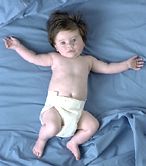Mothers Often Engage in Risky Infant Care Practices
Mothers often engage in infant care practices that increase the risk of sudden infant death, including bed-sharing, placing infants in a prone position for sleep in a bassinet, or cluttering the bassinet with objects that can cause suffocation, according to two studies published online June 26 in the Journal of Pediatrics.

THURSDAY, June 26 (HealthDay News) -- Mothers often engage in infant care practices that increase the risk of sudden infant death, including bed-sharing, placing infants in a prone position for sleep in a bassinet, or cluttering the bassinet with objects that can cause suffocation, according to two studies published online June 26 in the Journal of Pediatrics.
In one study, Linda Y. Fu, M.D., of the Children's National Medical Center in Washington, D.C., and colleagues assessed the infant care practices of 708 mothers of infants 8 months of age and younger. Overall, they found that 32.5 percent of mothers and infants bed-shared, and that blacks and teen mothers were most likely to bed-share despite the increased risk of sudden infant death syndrome (SIDS). The researchers call for future studies to identify the reasons why parents bed-share and develop interventions to change such practices.
In a second study, Jodi Pike, M.D., also of the Children's National Medical Center, and a colleague reviewed all 53 bassinet-associated deaths reported to the Consumer Product Safety Commission between 1990 and 2004, and found that 85 percent of the deaths were caused by anoxia, asphyxiation or suffocation, and that 9.4 percent were caused by SIDS. They also found that 37 percent of the infants were placed in a prone position for sleep, 50 percent were found dead in the prone position, and that 74 percent of the cases involved placement of additional items in the bassinet, such as soft bedding.
"The risk of sudden unexpected death in infants who sleep in bassinets can be reduced by following American Academy of Pediatrics guidelines, including positioning infants supine and avoiding soft bedding in bassinets," Pike and her colleague conclude. "In addition, parents must ensure that the bassinet is mechanically sound and that no objects that can lead to suffocation are in or near the bassinet."
Abstract - FuFull TextAbstract - PikeFull Text
Copyright © 2008 ScoutNews, LLC. All rights reserved.